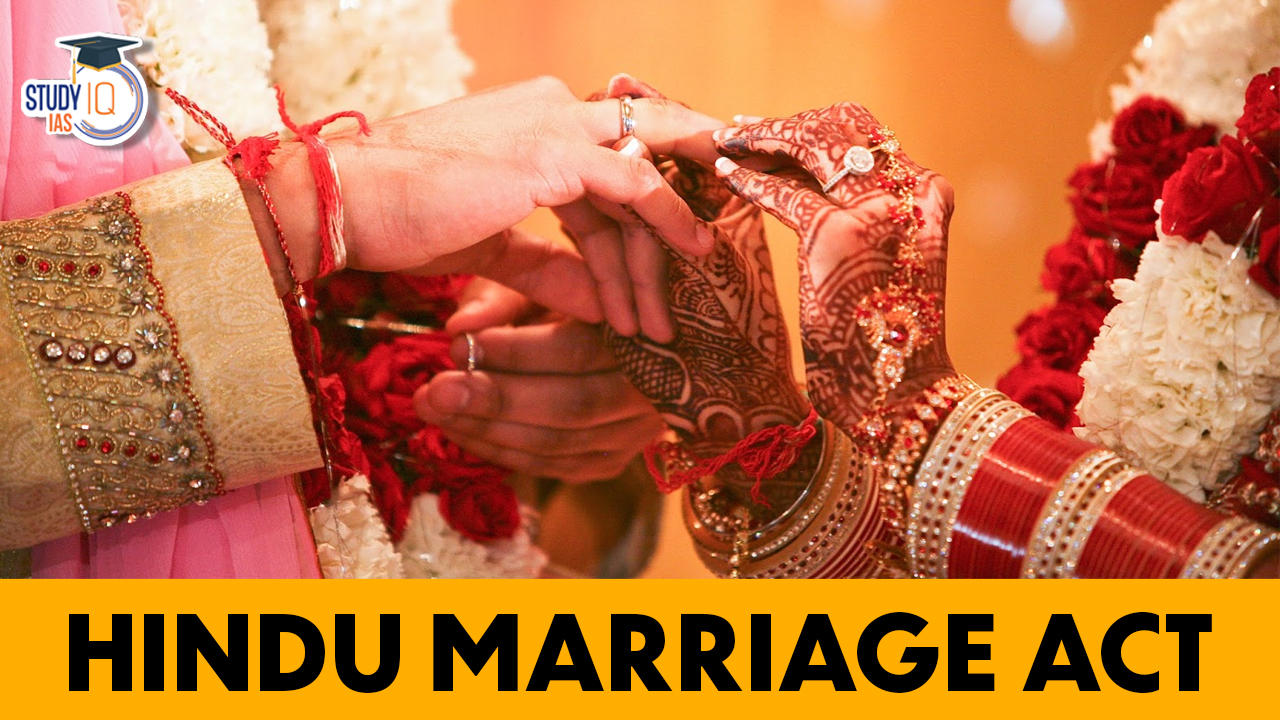Table of Contents
Hindu Marriage Act
In India, marriages between Hindus, Buddhists, Jains, and Sikhs are governed under the Hindu Marriage Act. For solemnising and recording weddings, it lays out the procedures and regulations. The legislation outlines the prerequisites for a legal marriage, the duties and rights of spouses, and the grounds for divorce.
One of the most crucial subjects for the UPSC IAS exam is the Hindu Marriage Act of 1955. It covers a sizeable portion of the Polity subject in the UPSC Prelims General Studies Paper-1 syllabus and the Mains General Studies Paper-II syllabus. Hindu Marriage Act is an important part of Indian Polity which is an important subject in the UPSC Syllabus. Students can also go for UPSC Mock Test to get more accuracy in their preparations.
Hindu Marriage Act Introduction
An important law in India that controls the solemnization and other aspects of Hindu marriages is the Hindu Marriage Act. It was passed in 1955 and is applicable to everyone who isn’t a Muslim, Christian, Parsi, or Jew, as well as Hindus, Buddhists, Jains, and Sikhs. The statute intends to control and safeguard how marriage is conducted within the Hindu community and to uphold certain rights and obligations.
Also Read: Surrogacy in India
Hindu Marriage Act Structure
In order to protect the rights of Hindu couples who get married, India created the Hindu Marriage Act in 1955. These regulations deal with Hindu family issues. The Hindu Succession Act, the Hindu Minority and Guardianship Act, and the Hindu Adoptions and Maintenance Act are three of the laws that were created in 1956. Hindu households place a lot of value on these deeds. Due to the variety of methods Hindus might get married based on their traditions, the rules do not specify exactly how a Hindu wedding should be conducted. Its goal is to ensure that Hindu brides and grooms have legal protections and privileges once they enter into the holy union of marriage.
Six Chapters make up the Act of 1955, which has a total of 29 Sections. The Act’s provided association is shown below.
| Chapters | Details |
| Preliminary | This part establishes the extent of the act’s applicability and provides definitions of terms used during the act. |
| Requirements for Hindu Marriage | It outlines the conditions that must be met in order for a Hindu marriage to be accepted. Age, intellectual capacity, and the absence of banned relationships are all examples of these circumstances. |
| Rituals for a Hindu Marriage | In this chapter, the various unique types of rituals that can be performed to officially solemnize a Hindu marriage are explained. It accepts legally recognized marriages as well as customary marriages. |
| Hindu Marriage Registration | It emphasises the significance of registering a Hindu marriage and provides guidance on the registration process. |
| Restitution of Conjugal Rights and Judicial Separation | This section discusses the rights of spouses to continue living together and the circumstances in which judicial separation may be requested. |
| Nullity of Marriage and Divorce | It describes the conditions under which a marriage may be deemed null and void as well as the divorce-related rules. |
| Maintenance | This section handles the issue of providing spouses and established children with money during and after a marriage’s breakdown. |
Hindu Marriage Act 1955
It applies to all of India, with the exception of the State of Jammu & Kashmir, and to both Hindu residents of the extended regions as well as those who are outside of them. Important factors include:
- It does not apply to members of any scheduled tribes unless the Central Government specifically directs otherwise by notification in the official Gazette.
- It applies to Hindus (in any of its forms or developments), as well as Buddhists, Sikhs, Jains, and those who are not Muslims, Christians, Parsis, or Jews by religion.
- Sections 13 of the Hindu Marriage Act and Section 27 of the Special Marriage Act both contain provisions relating to divorce.
- Under these Acts, the following broad categories constitute common grounds for divorce that either a husband or a wife may use: adultery, desertion, cruelty, insanity, venereal disease, mutual consent, and disappearance for seven years.
Hindu Marriage Act 1955 Important Sections
Hindu Marriage Act Section 9
Section 9 of the Hindu Marriage Act addresses circumstances where one spouse leaves the other without a good reason. It enables a spouse to request from a judge the restoration of their marital rights. Requesting the other spouse to move back in with you so that you can carry on living as a married couple is known as restitution of conjugal rights. The petition may be submitted by either the husband or the wife.
The petition must state that the respondent (the other spouse) has distanced themselves from the petitioner without a valid reason. The petition will be reviewed by the court, and it may be decided to use counselling or other methods to try to bring the parties together. The court may issue a decree for the return of conjugal rights if reconciliation is not possible. The ruling may outline the conditions for regaining conjugal rights.
When a respondent disobeys a court order, the petitioner may pursue legal remedies including contempt of court. It’s crucial to remember that physical force or coercion cannot be used to enforce the restoration of marital rights. The court may decide not to issue a ruling for the restoration of conjugal rights if it thinks there are good reasons for the withdrawal.
Hindu Marriage Act Section 13
The Hindu Marriage Act’s Section 13 addresses grounds for divorce. It clarifies when one spouse may request a divorce from the court. The various legal grounds for divorce discussed in this section include cruelty, adultery, abandonment, conversion to another religion, mental illness, and incurable medical illnesses. “Cruelty” refers to when one spouse injures the other so severely that they are unable to maintain their marriage, whether it be physically or mentally. When a married individual engages in sexual activity with a person other than their spouse, it is considered adultery.
Desertion occurs when one spouse abandons the other for at least two years without a valid reason. When one spouse leaves their Hindu faith and adopts a new one, that spouse has converted to a different religion. “Mental illness” refers to when one partner has a severe mental condition that makes it difficult to maintain a happy marriage. Diseases that are incurable and have a significant negative impact on the spouse’s health and emotions.
The impacted spouse may file for divorce if any of these grounds are shown to be valid in court. Remembering that divorce is a serious decision should come only after exhausting all other options for peacefully resolving the issues. It is advisable to seek legal counsel from an experienced attorney who is familiar with the law because divorce cases under Section 13 of the Hindu Marriage Act can be intricate and unique in each circumstance.
Hindu Marriage Act Section 24
The Hindu Marriage Act’s Section 24 addresses alimony and maintenance payments. The payment made by one spouse to the other during and after a divorce is referred to as maintenance. One spouse may request maintenance under Section 24 if they are unable to support themselves financially. The court decides the amount of maintenance by taking into account criteria like income, assets, and the financial needs of both spouses.
Depending on their needs and financial status, the husband or the wife may receive maintenance. When deciding on maintenance, the court also takes the standard of living throughout the marriage into account. Depending on the circumstances, maintenance can be given either monthly or all at once. If either spouse’s financial condition changes, the court may amend the support.
The court may review or terminate the maintenance if the spouse receiving it gets remarried or starts seeing someone else. It is crucial to remember that maintenance granted under Section 24 is just temporary and intended to give ongoing financial support until the divorce case’s final resolution.


 Right to Shelter is a Fundamental Right:...
Right to Shelter is a Fundamental Right:...
 Money Bill, Types, Articles and Constitu...
Money Bill, Types, Articles and Constitu...
 Governors of State: Appointment, Immunit...
Governors of State: Appointment, Immunit...

















